Will Democratic Superdelegates Block a Progressive in 2020?
Truthdig contributor Norman Solomon explores a harrowing but all-too-plausible scenario should Bernie Sanders or Elizabeth Warren prevail.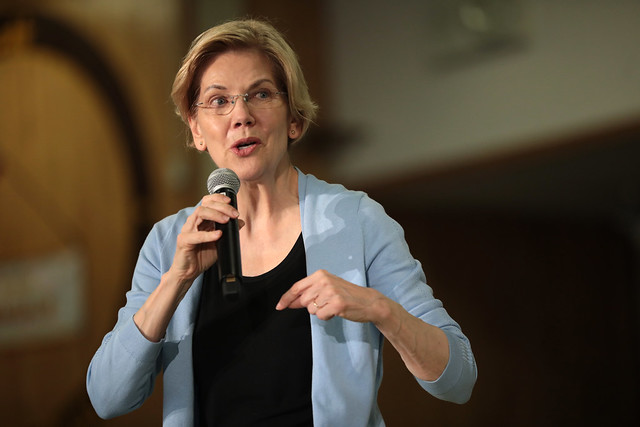 Sen. Elizabeth Warren, D-Mass. (Gage Skidmore / Flickr)
Sen. Elizabeth Warren, D-Mass. (Gage Skidmore / Flickr)
What follows is a conversation between journalist Norman Solomon and Greg Wilpert of The Real News Network. Read a transcript of their conversation below or watch the video at the bottom of the post.
GREG WILPERT It’s The Real News Network and I’m Greg Wilpert in Baltimore.
The race for the Democratic Party’s presidential nomination is now in full swing. Last month, we already had the first two debates among twenty of the candidates. The next double debate, this time on CNN, will take place in Detroit on July 30th and 31st. Fourteen candidates have so far qualified to participate. As the primary process heats up, attention is being placed once again on the role of the so-called superdelegates during the party’s convention, which will take place in Milwaukee, Wisconsin on July 13th to 16th in 2020. Superdelegates are elected Democratic Party officials, former distinguished party leaders, and state party officials. In the past, the superdelegates who were not pledged to any particular presidential candidate were able to vote for any candidate of their choice during the convention. Supporters of Bernie Sanders in 2016, however, objected to this rule saying that it biased the nomination process in favor of establishment candidates, such as Hillary Clinton. The nomination rules were thus changed last year so that superdelegates can no longer vote during the first ballot, but only during the second one and after, should no candidate have a majority of pledged delegates leading up to the first ballot.
Joining me now to discuss the Democratic Party’s nomination process is Norman Solomon. Norman is co-founder and National Coordinator of RootsAction.org. Also, he’s the founder and Executive Director of the Institute for Public Accuracy. Thanks for joining us again, Norman.
NORMAN SOLOMON Hey. Thank you, Greg.
GREG WILPERT So you were quite involved in the discussions about the superdelegate reform process last year. As a matter of fact, you were there at the DNC meeting last August to see the process. So before we get into what this new process means for the 2020 race, what did you think about the reform at the time it was passed? Was it a good compromise, or was it a bad one?
NORMAN SOLOMON It was an important step forward and it’s notable that a lot of the establishment of the DNC was very upset at that meeting that you mentioned in Chicago last August. We had people like Donna Brazil and others, members of Congress who are longtime Democratic elite leaders or at least manipulators, who were outraged that their power to affect the Democratic presidential nomination was in their view, being usurped and taken away. And they felt that they were being disempowered where actually, what was happening was that the electorate was being empowered and their disadvantages were being eliminated or at least sharply reduced. So the best solution would have been to simply get rid of superdelegates and their power to vote on the nominee, period. The best that could be done was to get rid of their power to affect a vote during the first ballot. And it’s important to recall that there hasn’t been a second ballot since 1952. So the danger is still there that the decision could go as far as a second ballot, but I would say the odds are against it next year.
GREG WILPERT That’s exactly what I want to turn to now. At the time that the DNC reformed the nomination process, it wasn’t clear that there would be 24 candidates running for the Democratic nomination. I think that must be one of the largest number of candidates ever running for the Democratic Party nomination. So as a result, since there’s so many candidates, wouldn’t that actually significantly increase the chances of no candidate winning in a clear majority, and thereby bringing us back to the old system where the superdelegates end up being the ones who brokered the decision and decide the race in the end?
NORMAN SOLOMON That’s an understandable fear. I think, at this point, it’s a misconception for two big reasons. First, is that the rules require that for a candidate to get any delegates from a state, from a congressional district when the delegates are representing that district, that candidate has to get at least 15% of the vote. And the vast majority of the candidates will come out of a particular primary or caucus with zero delegates. The other reality, which has become more clear in the last couple of weeks, is that there can be 24 candidates. There’s about five who are at this point likely serious contenders. You look at the numbers and the vast majority of those 25 or so, are somewhere between 0% and 1%, or 1.5%, of the national polling. And particularly, when you look at—And of course, it’s possible to see a change, but I think the odds are very strong that one of four people will be the nominee because they are at the first tier. And that is: Bernie Sanders, Elizabeth Warren, Joe Biden, or Kamala Harris. And after those four, there’s a very, very steep drop-off to single digits. The closest in the polling has been Buttigieg. And so, this field is going to winnow out pretty fast. And the vast majority of those two dozen candidates will be quickly irrelevant, and go to the convention in Milwaukee next summer with single-digit delegates, I believe, if at all.
GREG WILPERT Let me just push back a little bit for a moment. I mean, the thing is that, I mean, even if you end up with only four major candidates, if none of those four get an absolute majority— that is, more than 50% of the delegates in the first ballot— that still means it will go to a second ballot. And let’s say, presumably Biden might still be the frontrunner. Then he ends up getting the superdelegates, even if the other candidates in theory could have maybe won if the superdelegates hadn’t participated. I mean, what do you think about all that?
NORMAN SOLOMON Well, sure that could happen. It could have happened in 1988. It could have happened in 1984. It could have happened many times in the last several decades. So the theoretical possibility is there and, you know, my crystal ball is in the shop. Nobody knows for sure, but I would say that the chances that there will be a second ballot are low. Because as this happens, as the candidates are winnowed out, and most of them fall by the wayside quickly, and most of the rest of them pretty soon afterwards, you’re going to have a handful of contenders. So I understand people’s concerns. I think it’s important that we not only horse race or, you know, be the pundits, as valid as that might seem, but it’s activism that matters. If people don’t want it to go to a second ballot so that corporate powers can start to really put their thumbs on the scale, they ought to make sure, we ought to make sure that we don’t have a corporate frontrunner to begin with.
You know, Joe Biden is clearly, I believe, the worst candidate among anybody with a ghost of a chance of winning the Democratic nomination next year. And you know, Kamala Harris is also a corporate creature. So if we don’t want those lobbyists—And by the way, most of the superdelegates are simply elected Democrats, so they’re establishment people on the whole. If we don’t want them to have power over the nomination, we should also move forward now to make sure that the billionaire class doesn’t have power over who is the frontrunner. And while Joe Biden is sinking from where he was, he still has a lot of money, a lot of clout, a lot of friendly corporate media behind him. And that’s, I think, where activism kicks in. You know, if people organize effectively, we can change the news, we can change history, not just learn about it later on.
I should add one other thing. That the odds structurally are against progressive, genuinely left progressive candidates from being nominated for the presidency. The odds were also against this young activist named Alexandria Ocasio-Cortez. And the structure of the rules in New York preregistration requirements and so forth, made the conventional wisdom that this powerful guy named Joe Crowley was simply going to walk back into Congress, and we know the history. That was changed because people had— not to coin a phrase, it’s an old phrase— they had “pessimism of the intellect.” That they brought to bear not only their optimism of the will, but their organizing to change what had been forecast, and bring about a much better result.
GREG WILPERT Yeah. I think that’s a very good point. Though, one of—The other change, though, that has taken place is that now California, which used to be almost an afterthought in the nomination process because it was one of the last states to hold a primary, has now moved its primary race up to March 3rd. And it’s taking place together with other major states, so that up to a third of the delegates will be chosen on that March 3rd. Doesn’t that significantly increase the uncertainty of who will be the frontrunner, and therefore maybe also the possibility of actually having a brokered convention come July 2020?
NORMAN SOLOMON There’s certainly a lot of uncertainty in general. I think it’s coming with the territory— anytime you have some strong candidates with a chunk of money and, you know, some media momentum, if not grassroots. We have some Astroturf candidates. We have a couple of what I think are more genuine candidates— Elizabeth Warren and Bernie Sanders— with a lot of momentum. I’m here in California, and certainly it’s going to be a battlefield here, the biggest prize by far in terms of delegates. And one of the things that the Bernie Sanders campaign is doing is this distributed outreach, where we’re not reliant on the big media markets and the advertising budgets. You know, the Sanders campaign is very adequately funded. At the same time, the differential is going to be what happens on the ground.
And so, one thing I’d add is that the conventional wisdom has been so wrong that, you know, pundits may as well just go on vacation for the next year and a half in terms of being reliable. You know, Hillary Clinton was going to absolutely trounce Donald Trump according to the wise men and women of the pundit-ocracy. And so, you know, we don’t know and there’s so many variables. There’s a populist upsurge of bogus, racist, xenophobic media often driven upsurge or down surge from the right-wing, and there’s also a tremendous populist progressive upsurge at the grassroots. And I think that we can bring that to bear to realize that it’s not electoral work or nonelectoral work. That it’s all part of a larger hole that we can bring to bear. So the dangers, again, are there. They always are there. And corporate power, the elites, are using everything they can to maintain power. That’s all the more reason for us to organize.
GREG WILPERT Okay. Well on that note, we’re going to leave it there for now, but I’m sure we’re going to come back to you to talk about this more as we see how the race shapes up. I was speaking to Norman Solomon, co-founder and National Coordinator of RootsAction.org. Thanks again, Norman, for having joined us today.
NORMAN SOLOMON Thank you, Greg.
GREG WILPERT And thank you for joining The Real News Network.
Your support matters…
Independent journalism is under threat and overshadowed by heavily funded mainstream media.
You can help level the playing field. Become a member.
Your tax-deductible contribution keeps us digging beneath the headlines to give you thought-provoking, investigative reporting and analysis that unearths what's really happening- without compromise.
Give today to support our courageous, independent journalists.
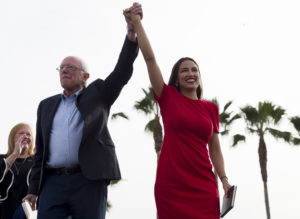
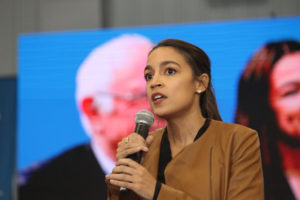

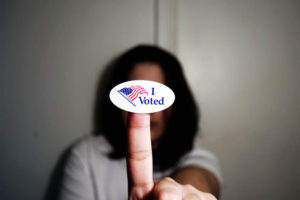
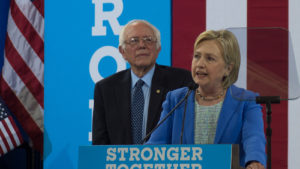
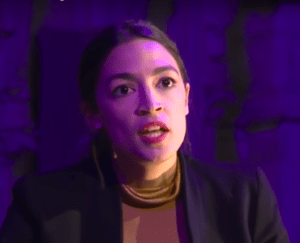
You need to be a supporter to comment.
There are currently no responses to this article.
Be the first to respond.